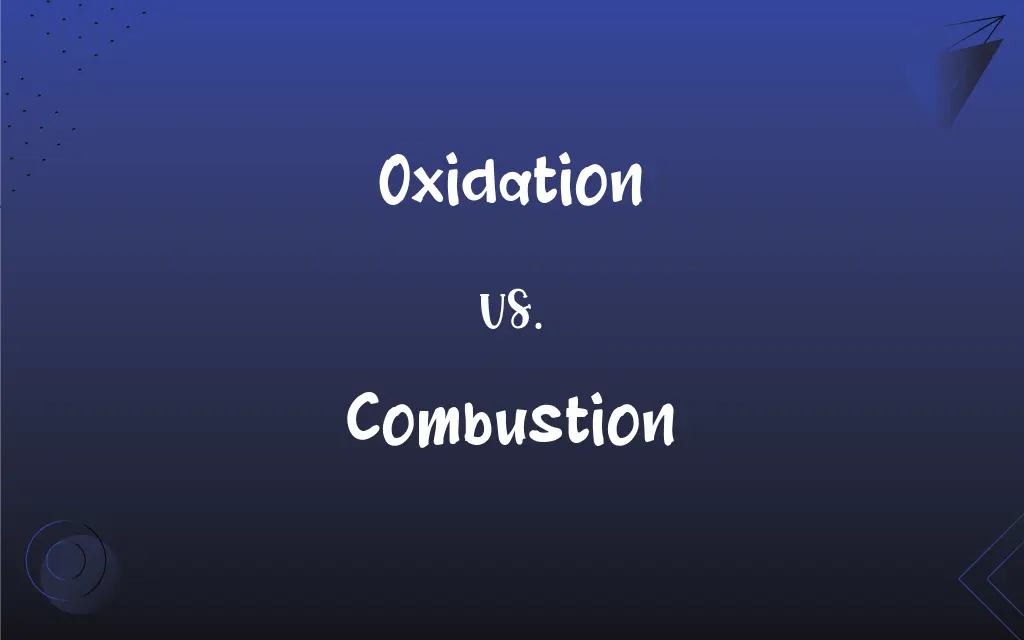Oxidation vs. Combustion: What's the Difference?
Edited by Janet White || By Harlon Moss || Published on December 11, 2023
Oxidation is a chemical reaction involving the loss of electrons or increase in oxidation state, while combustion is a specific type of oxidation that involves burning in the presence of oxygen.

Key Differences
Oxidation is a broad chemical process where an atom, molecule, or ion loses electrons, often associated with gaining oxygen. This process does not necessarily involve burning or flame. Combustion, on the other hand, is a specific type of oxidation that occurs rapidly, producing heat and light, typically seen as fire, and always involves a fuel and an oxidant, usually oxygen.
In oxidation, the substance that loses electrons is said to be oxidized. This reaction can occur slowly, like in the rusting of iron, and does not always produce noticeable heat or light. Combustion is a rapid process where the fuel is oxidized, releasing energy in the form of heat and light, such as in the burning of wood or gasoline.
Oxidation reactions are fundamental in various biological processes, including metabolism and photosynthesis, and can occur in both aerobic (with oxygen) and anaerobic (without oxygen) environments. Combustion, however, is a chemical reaction that always requires oxygen (or another oxidizing agent) and is primarily used for energy generation, such as in engines and power plants.
The oxidation process can be part of various industrial and chemical applications, including metal corrosion, battery discharge, and wine making, where the change in oxidation state is a key factor. Combustion is deliberately used in controlled environments for specific purposes like heating, propulsion, and energy generation, where the rapid oxidation of a fuel substance is essential.
Oxidation does not imply fire or heat generation necessarily, as it can be a slow, low-energy process. Combustion is always associated with fire and is a high-energy process where the fuel combines with oxygen, resulting in heat, light, and often smoke and other gases.
ADVERTISEMENT
Comparison Chart
Definition
Chemical reaction involving loss of electrons.
Rapid chemical reaction with heat and light.
Requirement of Oxygen
Can occur with or without oxygen.
Requires oxygen or an oxidizing agent.
Energy Release
May or may not release energy.
Always releases energy (heat and light).
Speed of Reaction
Can be slow or fast.
Typically a rapid process.
Typical Manifestation
Rusting, corrosion, aging.
Burning of fuels, fires, explosions.
ADVERTISEMENT
Oxidation and Combustion Definitions
Oxidation
A process in which an atom's oxidation state increases.
The oxidation of copper produces a green patina.
Combustion
A chemical process of burning in the presence of oxygen.
The combustion of wood in a fireplace provides heat.
Oxidation
A reaction that involves the removal of hydrogen.
The oxidation of alcohol to aldehyde in wine making.
Combustion
The rapid oxidation of a substance accompanied by heat and light.
The combustion of gasoline powers car engines.
Oxidation
The process where a substance loses electrons.
The oxidation of iron leads to rust formation.
Combustion
A reaction where a fuel combines with oxygen, releasing energy.
Combustion in a furnace heats homes during winter.
Oxidation
A chemical reaction in which a material gains oxygen.
The oxidation of glucose in the body provides energy.
Combustion
A process in which organic compounds are burned to release energy.
The combustion of coal in power plants generates electricity.
Oxidation
A process in biochemistry where substrates lose electrons.
Cellular respiration involves the oxidation of food molecules.
Combustion
An exothermic reaction involving fuel and an oxidant.
The controlled combustion in a stove allows for cooking.
Oxidation
The combination of a substance with oxygen.
Combustion
The process of burning.
Oxidation
A reaction in which the atoms of an element lose electrons and the valence of the element is correspondingly increased.
Combustion
A heat-producing chemical reaction in which a fuel combines with oxygen or with some other substance that behaves chemically like oxygen.
Oxidation
The combination of a substance with oxygen.
Oxidation
(chemistry) A reaction in which the atoms of an element lose electrons and the oxidation state of the element increases.
Oxidation
The act or process of oxidizing, or the state or result of being oxidized.
Oxidation
The process of oxidizing; the addition of oxygen to a compound with a loss of electrons; always occurs accompanied by reduction
FAQs
Does oxidation always produce heat?
Not always; oxidation can occur at various temperatures, sometimes without noticeable heat.
Can oxidation happen without oxygen?
Yes, oxidation can occur without oxygen in reactions involving other oxidizing agents.
What is an example of oxidation?
Rusting of iron is a common example of oxidation.
Can oxidation be reversed?
In some cases, yes, through reduction or other chemical processes.
Is oxidation a slow process?
It varies; oxidation can be rapid or slow, depending on the materials and conditions.
Is oxidation only related to oxygen?
While often involving oxygen, oxidation can occur with other substances that cause electron loss.
What is oxidation?
Oxidation is a chemical reaction where a substance loses electrons, often involving oxygen.
Is combustion always visible?
Typically yes, as it often produces flames or glow, but some combustion can be less visible.
Can combustion occur without oxygen?
No, oxygen is essential for combustion.
Are antioxidants related to oxidation?
Yes, antioxidants are substances that can slow or prevent oxidation.
What is the role of a catalyst in combustion?
Catalysts can lower the activation energy, making combustion occur more easily or at lower temperatures.
What is a reducing agent in oxidation?
A reducing agent is a substance that donates electrons to another substance in an oxidation reaction.
Can combustion be complete or incomplete?
Yes, it can be complete (with sufficient oxygen, producing CO2) or incomplete (limited oxygen, producing CO).
Are all combustions explosive?
Not all; combustion can range from a slow burn to an explosive reaction, depending on conditions and materials.
How does oxidation affect metals?
Oxidation can cause metals to corrode or rust, altering their strength and appearance.
What causes spontaneous combustion?
It occurs when materials heat up due to internal chemical or biological reactions until they ignite.
What is combustion?
Combustion is a chemical reaction where a substance rapidly combines with oxygen, releasing heat and light.
What are the products of combustion?
Combustion commonly produces carbon dioxide, water vapor, heat, and light.
How is combustion controlled in engines?
Through the precise timing of fuel and oxygen intake and spark ignition.
Is combustion a type of oxidation?
Yes, combustion is a rapid form of oxidation.
About Author
Written by
Harlon MossHarlon is a seasoned quality moderator and accomplished content writer for Difference Wiki. An alumnus of the prestigious University of California, he earned his degree in Computer Science. Leveraging his academic background, Harlon brings a meticulous and informed perspective to his work, ensuring content accuracy and excellence.
Edited by
Janet WhiteJanet White has been an esteemed writer and blogger for Difference Wiki. Holding a Master's degree in Science and Medical Journalism from the prestigious Boston University, she has consistently demonstrated her expertise and passion for her field. When she's not immersed in her work, Janet relishes her time exercising, delving into a good book, and cherishing moments with friends and family.































































